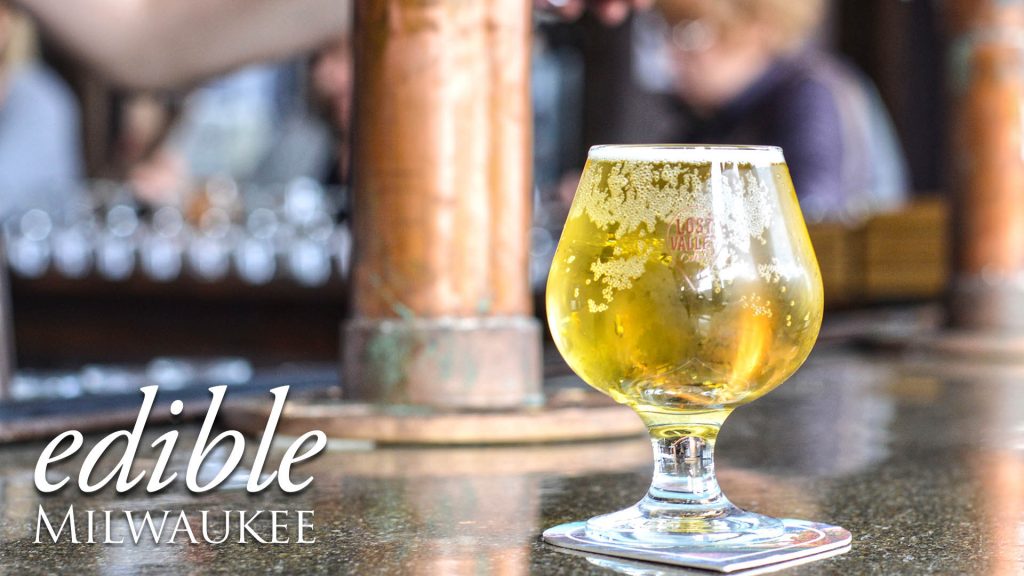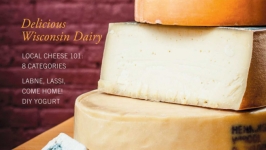Cider Spike
Wisconsin Makers Grow in an Artisan Market
It only took one flip of a switch for the sweet and alluring smell of apples to permeate every inch of the warehouse. Minutes prior, Joseph Baird, president of Mershon’s Artisan Cider, and his assistant, Aaron Bloom, took turns pouring buckets of Midwest-grown apples into a hopper. The machine’s whirling blades effortlessly spit out pulverized, perfumed bits of the once-whole fruit.
The two-man show continued as the pulp is juiced, combined with Wisconsin wildflower honey, heated and fermented. From fresh apple to finished product, Mershon’s ciders take about one month. “All of these companies try to get fancy with it, but we keep it simple,” says Baird. “We try and make it traditionally, and that means it takes time.”
Similar to winemaking, the process for cider remains relatively unchanged since the drink was first enjoyed centuries ago — that is, of course, if what one is making is a true, hard cider. Thankfully, there are an increasing number of Wisconsin-run cideries dedicated to preserving the legacy of cider; sourcing local ingredients, using heirloom apples and focusing on high quality, small-batch production.
Once cider was identified as an untapped niche in the alcoholic beverage industry, major brewing corporations began mass-producing ciders. “When I started in the late 90s, cider was the fastest growing category of alcohol,” says Charles McGonegal, owner of ÆppelTreow Winery & Distillery. “And it’s still the fastest growing.” Nationally, the cider industry went from about a $50 million industry in 2010 to nearly $300 million industry in 2014.
To meet the demand, the majority of largescale producers use concentrates, artificial sweeteners and preservatives. These ingredients act as shortcuts, expediting the process and increasing volume. Yet, the finished product is often much sweeter than an artisan cider and sometimes skips out on real fruit juice entirely.
Compared to the ingredients and processes used by Wisconsin’s artisan cider makers, the differences between craft and commercial cider are drastic.
If you ask McGonegal about the heritagebreed apples and pears he uses for his ciders, his answer will be part history lesson, part chemistry class. With ÆppelTreow located on the property of Brightonwoods Orchard in Burlington, McGonegal has easy access to 200 apple varieties, some of which date back to the days of our founding fathers. Low sugar levels coupled with high acidity and tannins make many of these relatively small, knobby looking heirloom apples ideal for cider, but inedible for out-of-hand snacking. By mixing and matching specific varieties, some heirloom and some supermarket regulars like Red Delicious or McIntosh, McGonegal is able to draw out specific characteristics in the cider. Some are tannic and dry, while others are on the slightly sweeter, effervescent side.
“Brewers rarely get to play with growing their own grain,” says McGonegal. “Whereas, the field-to-glass story for cider is really direct.” Other cider makers, like Barb and Jim Lindemann of Cider House of Wisconsin, have an orchard filled with what they call “antique” cider apples. “We’re losing the heritage of very rare and tasty apples,” says Lindemann. Yet, he is optimistic that an increase in artisan cider making can help preserve the heirloom varietals found across the state.
So far, using heirloom apples and staying true to authentic cider making practices has paid off for Wisconsin cideries. Not only are rare apple varietals being revived, but Wisconsin ciders are being recognized at the national level. In April, Ela Cider Co.’s “Stone Silo” clinched a silver medal at the Great Lakes International Cider & Perry Competition (GLICPC) while also winning a 2016 Good Food Award for being “Tasty, Authentic, and Reliable.” Other Wisconsin cideries to win at GLICPC include Island Orchard Cider and ÆppelTreow.
Much of what challenges artisan cider makers is a lack of consumer education. For many years, commercial cider was all consumers knew, making it difficult for smallbatch, artisan cideries to break into the industry. Yet, similar to the rise of craft breweries, cider makers are educating consumers about how to appreciate the artisan product. Besides conducting in-store demos, many Wisconsin cider makers welcome guests for tours and tastings. This provides an opportunity for the consumer to understand what makes artisan cider different and how to properly enjoy the product. Baird says that in many cases the first step to getting people to try Mershon’s ciders is persuasion. “It’s not only educating about our ciders and the big brands, but a lot of it is convincing people to try cider again. A lot people try one of the major cider brands and are too sweet. So much of it is convincing them to give cider another chance.”
In Milwaukee, there is a new space for giving cider a second shot. Lost Valley Cider Co., owned by the father-daughter duo of Stuart and Chandra Rudolph, is the first cidercentric bar in the Milwaukee area, located at 408 West Florida Street in Walker’s Point. Featuring local, national and international ciders, along with more than a dozen ciders on tap, Lost Valley Co. is a refreshing change of pace for cider and beer lovers alike. Since opening in May, the Rudolphs have seen a spectrum of guests—from those who are gluten-intolerant or celiac to Milwaukeeans who are just looking to learn about cider. “There are so many people who have heard about cider but really don’t know that much about it,” says Rudolph, who first explored cider during a period of dietary restriction in her early 20s.
Other guests who walk through the door view Lost Valley as a refuge of sorts— offering an environment where their drink of choice is the majority rather than the after-thought tap at the beer-driven bar. “We’re basically a safe haven where you can have all these drinks that don’t have any gluten in them,” says Rudolph, who also offers gluten-free cocktails and bar snacks.
To take education to the next step, Sunday afternoons at Lost Valley are specifically geared towards classes highlighting specific cider topics, such as regionally made ciders or the history of cider. The Rudolphs, like other Wisconsin cider makers, believe education is key to enjoying artisan ciders. “Once people sit down, learn and sip, their perception of cider is changed,” says Rudolph.
You Pick 6
Here are half a dozen Wisconsin cider makers that welcome guests for tours and tastings. Hours of operation are dictated by season—please visit them online or call for more information.
ÆppelTreow
1072 288th Ave., Burlington
262-878-5345
Bayfield Winery
6565 County Hwy J, Bayfield
715-779-5404
Cider House of Wisconsin
4259 Mahoney Road, McFarland
608-838-6797
Island Orchard
12040 Garrett Bay Road, Ellison Bay
920-854-3344
Maiden Rock Winery & Cidery
W12266 King Lane, Stockholm
715-448-3502
White Winter Winery
68323 Lea St., Iron River
715-372-5656






